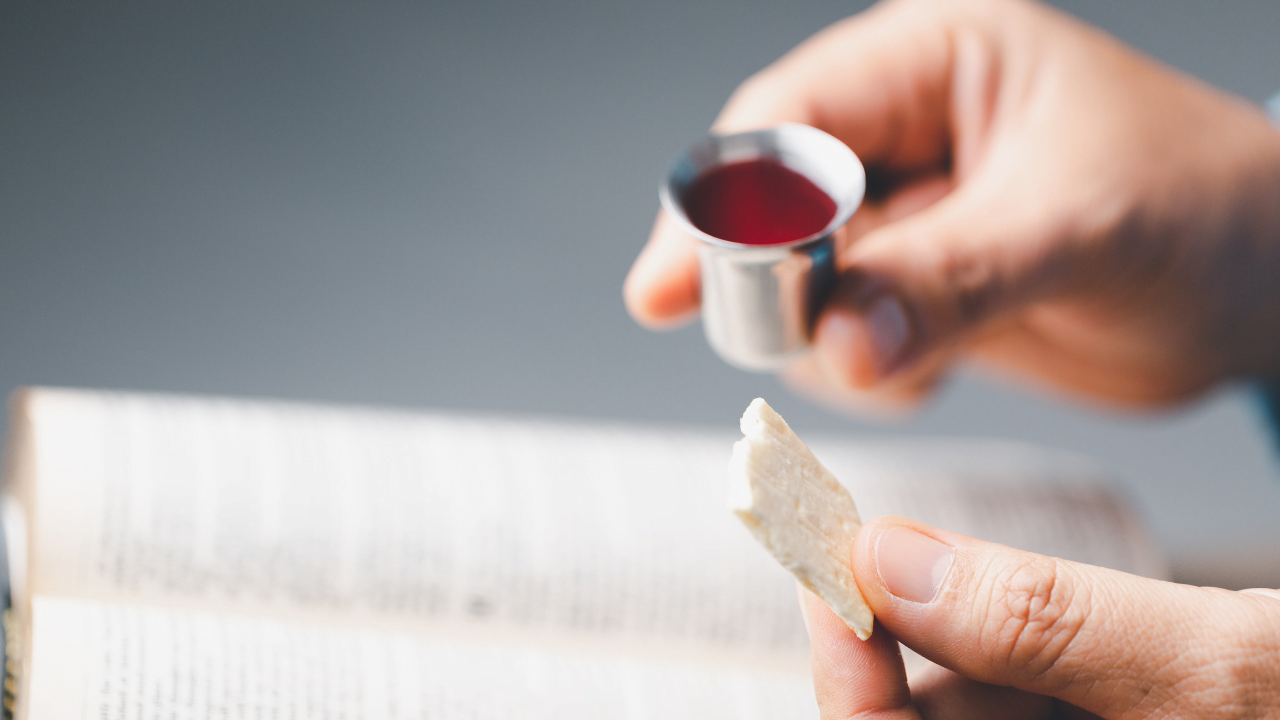No products in the cart.
The Meaning Behind Christian Sacraments
This post contains paid and/or affiliate links. I make a small commission at no extra cost to you. Please see our Privacy Policy.
The meaning of Christian sacraments and the differences between denominations. Christian sacraments are religious ceremonies or rituals with significant meaning in the Christian faith. They are recognized by various denominations and are considered pathways to divine grace.
Sacraments play a crucial role in believers’ spiritual journey and expression of faith. Although the specific sacraments may differ among denominations, some of the most common ones include baptism, the Eucharist, penance, and the anointing of the sick.
These sacraments serve as visible signs of inward grace and were instituted by Jesus Christ to symbolize and confer grace upon believers. Each denomination may have its unique understanding and practice of sacraments, resulting in variations between denominations.
The definitions and meaning of sacraments in the Christian Church. In addition to the sacraments recognized by Protestant, Eastern Orthodox, and Oriental Orthodox churches, we shall examine the seven sacraments recognized by the Catholic Church. We can recognize these sacraments’ significant influence on the Christian religion and its adherents by comprehending their significance and variations.
The Definition of Sacraments
In the Christian Church, sacraments are religious ceremonies, or rituals believed to bestow divine grace. They are visible signs of inward grace and are considered important solemn rites within the Christian faith.
Different denominations may have slightly different definitions and understandings of sacraments. Still, they generally agree that sacraments are means through which God’s presence and grace are manifested in the lives of believers.
The Seven Sacraments of Catholicism
The Catholic Church recognizes seven sacraments that play a significant role in the spiritual life of its members. These sacraments are highly regarded as channels of divine grace, symbolizing and bestowing specific spiritual benefits. Let us explore each of these sacraments:
- Baptism: This sacrament is considered the door to all other sacraments. Through baptism, individuals are initiated into the Christian faith and receive the forgiveness of original sin.
- The Eucharist: Also known as Holy Communion, the Eucharist involves the reception of the actual Body and Blood of Jesus Christ. It is a powerful sacrament that unites believers with Christ and nourishes their souls.
- Confirmation: In this sacrament, individuals receive an outpouring of the Holy Spirit, strengthening their faith and equipping them to live as authentic witnesses of Christ.
- Reconciliation (Penance or Confession): Through the sacrament of reconciliation, believers can confess their sins and receive God’s forgiveness. It is a moment of spiritual healing and renewal.
- Anointing of the Sick: This sacrament offers comfort and healing to those who are ill or facing severe health challenges. It brings the grace of God’s strength and peace to those in need.
- Marriage (Matrimony): The sacrament of marriage joins a man and a woman in a lifelong covenant. It is a sacred bond that sanctifies their love and calls them to mutual self-giving.
- Holy Orders: Through the sacrament of holy orders, men are ordained to serve as deacons, priests, or bishops in the Catholic Church. They are called to shepherd and guide the faithful, administering the sacraments and leading the community in worship.
These seven sacraments hold immense significance in the Catholic faith, providing believers opportunities for spiritual growth, forgiveness, healing, and connection with God. They are a vital part of the Catholic Church’s tradition and the religious journey of its members.
Sacraments in Protestant Churches
Protestant churches recognize two sacraments: baptism and communion, also known as the Lord’s Supper or the Eucharist. While the Catholic Church and some Orthodox churches believe in the sacramental nature of the Eucharist, Protestants view it as a symbolic memorial of Jesus’ sacrifice.
Baptism is an outward sign of inward faith and commitment to Christ. It represents a believer’s initiation into the Christian faith and the forgiveness of sins. Protestant denominations may have variations in baptismal practices, such as infant baptism or believer’s baptism by immersion or sprinkling.
Communion is a significant sacrament in Protestant churches. It commemorates Jesus’ Last Supper with his disciples, where bread and wine (or grape juice) are consumed to remember the body and blood of Christ. While understanding the Eucharist varies among denominations, it generally symbolizes the believer’s spiritual nourishment and unity with Christ and other believers.
Variations Among Denominations
Protestant denominations may have variations in how they practice and understand these sacraments. For example, some churches may celebrate communion regularly, such as every Sunday, while others may observe it less frequently. The theological significance and rituals surrounding baptism and communion can also differ.
- In some Protestant denominations, baptism is seen as a sacrament that marks the entry into the community of faith. In contrast, it may be considered an essential but non-sacramental act in others.
- Regarding communion, some denominations believe in the real presence of Christ in the elements, while others see it as a purely symbolic act of remembrance.
These variations reflect the diversity of theological interpretations and practices within Protestantism. However, regardless of the differences, baptism and communion are regarded as essential acts of worship and spiritual significance in Protestant churches.
Other Sacraments and Views on Sacraments
In addition to the Catholic and Protestant views on sacraments, other Christian traditions offer distinct perspectives on this topic. Two such traditions are the Eastern Orthodox Church and Oriental Orthodox churches.
The Eastern Orthodox Church, like the Catholic Church, recognizes the seven sacraments. However, they refer to these sacraments as sacred mysteries. These sacraments are viewed as means through which believers can encounter the grace of God and deepen their relationship with Him.
The Oriental Orthodox churches also share a similar perspective to the Eastern Orthodox Church. They, too, recognize the seven sacraments as sacred mysteries, emphasizing their importance in spiritual life and Christian practice.
It’s worth noting that not all Christian denominations observe sacraments similarly. For example, the Religious Society of Friends, known as Quakers, does not have a formal sacramental tradition. Instead, they see sacraments as reminders or commendable practices rather than channels of divine grace.
Each perspective on sacraments brings unique insights and approaches to the Christian faith, enriching the broader community’s diversity.
The Significance of Sacraments in Christian Faith
Sacraments play a crucial role in the Christian faith, embodying the presence of God and the conveyance of divine grace. These sacred rituals hold deep spiritual meaning for believers and serve as powerful expressions of their faith and devotion.
Through the sacraments, Christians are believed to forge a deeper relationship with God and experience profound spiritual growth. Each sacrament holds its significance and purpose, providing unique opportunities for believers to connect with the divine and strengthen their bond with their Creator.
The sacraments serve as tangible manifestations of faith and acts of worship that unite individuals with Christ and the community of believers. They offer opportunities for reflection, prayer, and the reception of God’s grace.
1. Sacraments as Visible Signs of Faith
- The sacraments symbolically represent God’s transformative work within believers’ lives.
- They provide physical and tangible expressions of the spiritual realities of the Christian faith.
2. Sacraments as Acts of Worship
- Participating in the sacraments allows Christians to engage in worship and actively express their devotion to God.
- They are moments of dedication, gratitude, and surrender to the divine presence.
3. Sacraments as Channels of Grace
- The sacraments are believed to confer the grace of God upon individuals, nourishing their souls and aiding in their spiritual journey.
- Through the sacraments, believers receive divine blessings, forgiveness, healing, and empowerment.
By embracing the sacraments, Christians deepen their understanding of Christian beliefs and practices while strengthening their connection with God and fellow believers. The sacraments provide opportunities for introspection, communion, and divine communion, leading individuals toward a more profound and meaningful relationship with their Creator.
Conclusion
In conclusion, sacraments are vital in Christian faith traditions, serving as significant religious ceremonies and rituals believed to convey divine grace. Although the specific sacraments recognized vary among denominations, the Catholic Church acknowledges seven sacraments, while Protestant churches focus on baptism and communion.
These sacraments hold deep spiritual meaning and are visible signs of inward grace. They provide believers opportunities to strengthen their relationship with God and deepen their faith. Sacraments are worship and devotion that unite individuals with Christ and their religious community.
While understanding and practices of sacraments may differ, their importance in the Christian community as a means of spiritual growth and the expression of faith is widely recognized.
Through sacraments, believers experience the manifestation of God’s presence and the communication of divine grace, allowing them to navigate their spiritual journey with a profound sense of connection to their faith and the teachings of Jesus Christ.
FAQ
What are sacraments?
Sacraments are religious ceremonies or rituals within the Christian faith that are believed to impart divine grace.
How many sacraments does the Catholic Church recognize?
The Catholic Church recognizes seven sacraments: baptism, the Eucharist, confirmation, reconciliation, the anointing of the sick, marriage, and holy orders.
What is the difference between sacraments in Protestant churches and the Catholic Church?
Protestant churches generally recognize two sacraments, baptism, and communion, while the Catholic Church recognizes seven. Protestant churches often view the Eucharist as a symbolic memorial rather than a sacrament.
Do all Christian denominations practice sacraments in the same way?
No, different Christian traditions may have variations in their understanding and practice of sacraments. For example, the Eastern Orthodox Church and Oriental Orthodox churches also recognize the seven sacraments but refer to them as sacred mysteries.
What is the significance of sacraments in the Christian faith?
The sacraments play a significant role in the spiritual journey and expression of faith. They are seen as visible signs of inward grace and serve as tangible expressions of faith and acts of worship that unite individuals with Christ and the community of believers.













